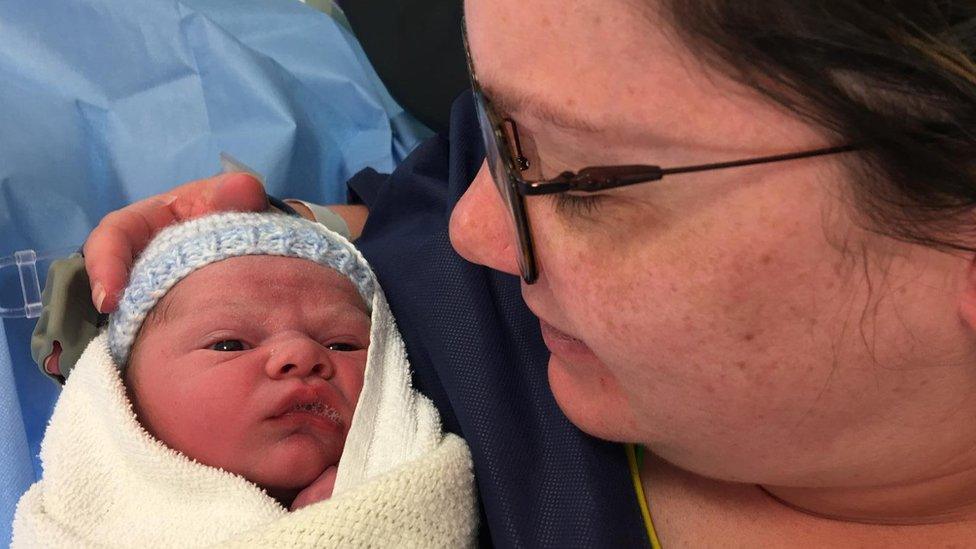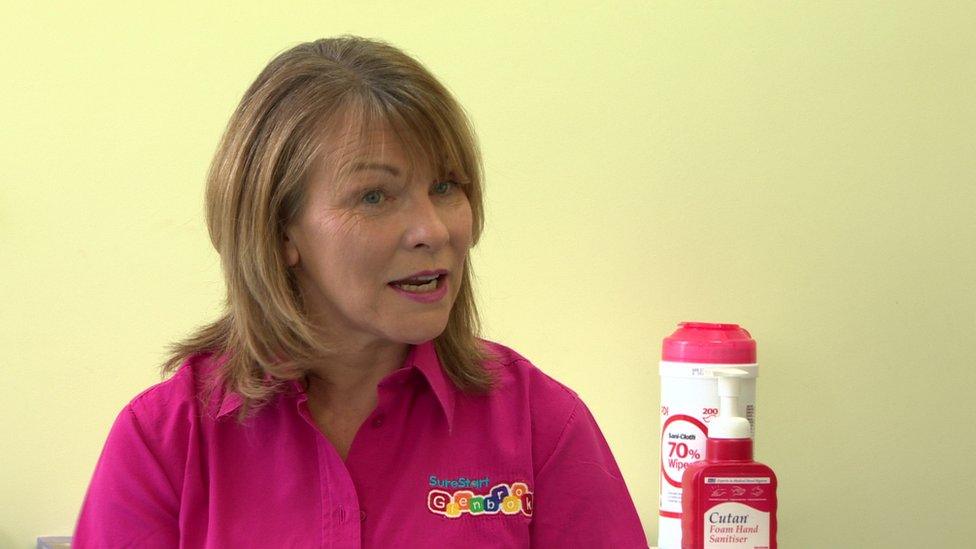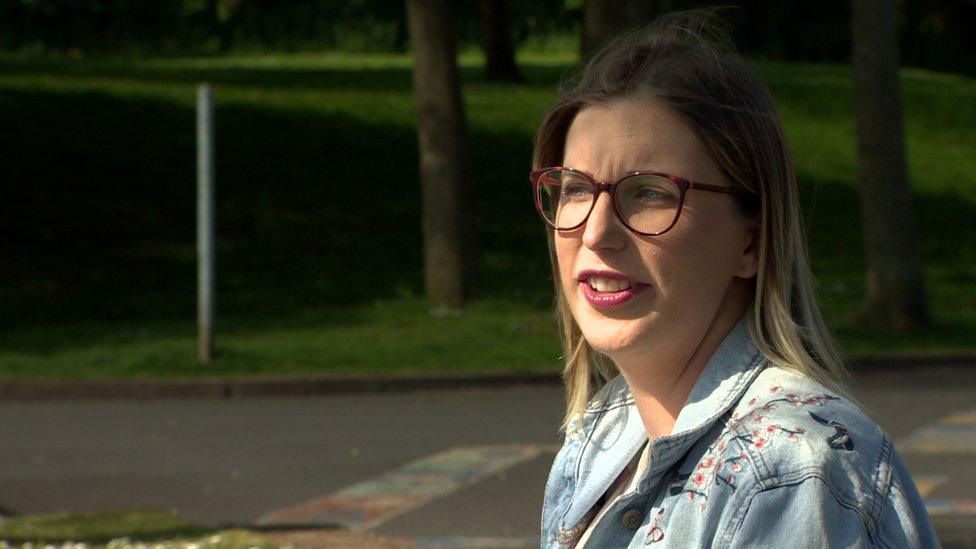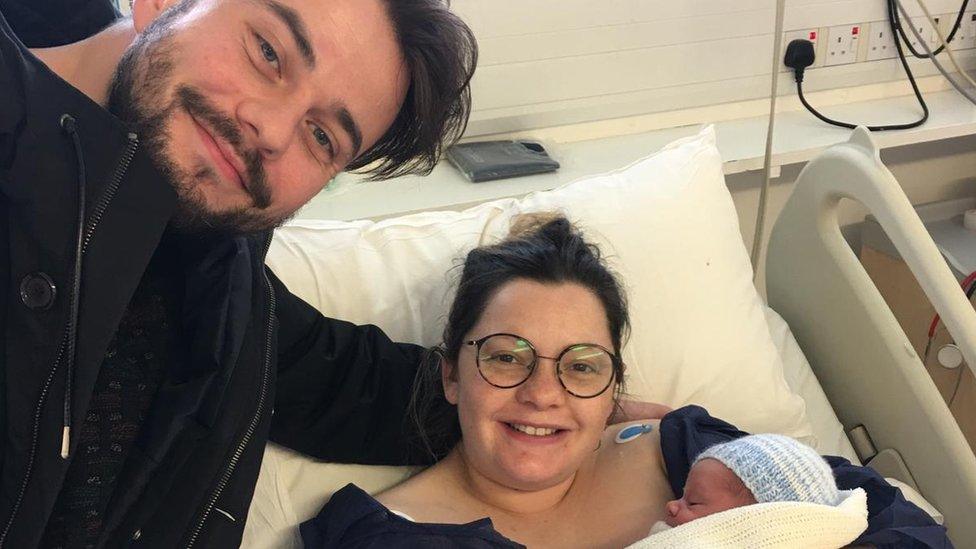Coronavirus: Giving birth during a pandemic
- Published

Aine O'Hagan said she was very anxious about what the lockdown restrictions would mean for her
Babies don't care if there is a global pandemic. They are going to grow and arrive into the world whenever they see fit.
Oblivious to everything that's going on in the outside world, they have their own body clock and everyone else has to work around it.
So spare a thought for the mothers and midwives who are trying to juggle their imminent arrival and their first weeks in the middle of a health crisis.
Working out of the Wishing Well Family Centre in north Belfast, the Glenbrook Sure Start programme has also had to adapt.
The staff there used to have a very hands-on approach, but things have changed.
The lead midwife on the programme is Mairead Mulligan. She works alongside local GPs, community midwives and health visitors.
Her job is to provide an add-on antenatal and postnatal service for women who may need extra support.

Midwife Mairead Mulligan has created WhatsApp groups for expectant mothers to stay in touch
Elsewhere, community midwife appointments are carrying on as normal, but most have been moved to more centralised locations.
But Mairead had moved from the Glenbrook centre to her own home.
She no longer has any face to face consultations but has become an expert in remote communication.
From her phone - Mairead has provided a service she believes is bringing women together and in fact giving them more control.
She has created WhatsApp groups for many of her expectant mums. They get to know each other and chat about how they are feeling, give suggestions and share ideas.
Mairead pops in to check how everyone is and gives advice where needed or a call to someone who is struggling.
As well as group chats, she gives out "bite-sized chunks" of information on everything from the current guidelines for delivery, online antenatal classes, breastfeeding videos and information on vaccines.
But often it is just a listening ear for all the "questions that are worrying them at home, that they can't really ask anyone else or don't want to ring the hospital or the GP because they are so busy".
And for those on the receiving end that support is greatly appreciated.

Jenny McMahon and her mother log into antenatal classes online
Jenny McMahon is expecting her first baby in July. She lives on her own and has been self-isolating from the beginning of restrictions.
Her mother lives locally but because she too is isolating, it has been a lonely and very tough period for Jenny.
Walking to her mum's house as part of her exercise routine has become the highlight of her day.
She misses "that physical touch of just even a hug" and admits to spending quite a few days of the first few weeks just sitting in her room crying, but things are getting better.
With a pregnancy dose of insomnia she has taken to filming her baby's movements and sending them to her mother.
Jenny had planned to have her mum with her at her antenatal classes but with classes cancelled they have the next best thing.
Jenny and her mum will log on to her online antenatal class at the same time. Mother and daughter going through the classes together, even though they know they won't be at the delivery together.
Ever the optimist, Jenny says it will be a "good experience even if it is not the normal one".
'Don't panic'
For Aine O'Hagan, the build-up to giving birth was at the same time as the lockdown began.
Sitting with baby Ezra now, she said prior to the birth she was very anxious as to what the lockdown restrictions would mean for her and worried that her husband would not be able to be with her during delivery.
On the day he was there, but was only allowed to come into the delivery ward when she was very near to giving birth, something she found really isolating.
But now a few weeks later, with a new baby in her arms, she says: "It was much different to when I had my first child, but looking back on it now, it wasn't as bad as I had built it up to be."
Aine is breastfeeding and Ezra is thriving. She is grateful for the breastfeeding guidance of the midwives in the hospital and is now in regular contact with Mairead to make sure she is doing everything right.

Aine O'Hagan and husband Dermot welcome baby Ezra into the world
Not only has she got a trusted midwife in Mairead, she has also connected with the women on Mairead's breasting group.
It is not face-to-face, but the help and the camaraderie is exactly the same.
Her advice for expectant mums - don't panic!